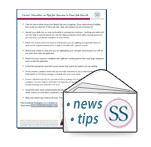Your Job Offer Questions Answered! 
Many of the people we work with ask us the same questions about job offers, so we wanted to give you some tips that can help you during this part of your job search. Here are some of the common job offer questions that we receive:
I’ve been interviewing for several jobs simultaneously. What if two companies offer me a job?
This is a great situation to be in! Sometimes, it’s an easy decision to make. But it can also be a difficult decision if you like both companies. A “pros and cons” list can be a good way to objectively evaluate which position is the best fit. Possible categories to assess can include: salary, benefits, work/life balance, company culture and reputation, commuting time/telecommuting, if you will find the work challenging and interesting, who you will be working with and for, industry stability, and whether the job fits into your long-term career plans.
I’ve interviewed with two companies. I’ve been offered a job with Company A, but I want to see if I get an offer from Company B (which is the company I really want to work for). How do I handle this?
Do you have an idea of when Company B will be making a hiring decision? That can influence how you handle your response. If you’ve interviewed with both companies, and you expect a response from Company B in the next 48-72 hours, you may be able to “stall” Company A by requesting the offer in writing so you can review it “before accepting.” If Company B hasn’t told you when the hiring decision will be made, contact the hiring manager and ask about a timeframe. You may even mention that you have been offered another position, but theirs is the job you really want, and you wanted to follow up to see what the timeframe is for making a decision before you let the other company know if you were going to accept their offer. Keep in mind, though, if you put off Company A for too long or don’t act “interested enough” you may wind up losing that job offer.
I thought that I was going to receive a job offer. The hiring manager talked about salary and benefits and even showed me which office would be mine, but I have not heard anything from him in two weeks. Now what?
There are many reasons why a job offer might be late-arriving. Most of them are out of your control. For example, the hiring manager might have had an unexpected project or emergency come up that delayed the job offer. Or the human resources department may have had difficulty connecting with the individuals you listed as references. Sometimes, the hiring process is simply put on hold. However, other times you may think you have received positive feedback that signals that a job offer is forthcoming, but the offer never comes. This is why it is important to ask in the job interview about the timeline. If the hiring manager says you can expect to hear back in one week, then follow up after a week.
What if I don’t get offered the job? How do I find out why I wasn’t selected?
The easiest way to find out is to ask. You can send the hiring manager a thank you note that also requests feedback on your candidacy; however, you’re unlikely to get a response unless you follow that up with a phone call or email. And a phone call will probably yield your best chance to find out why, if you can get the hiring manager on the phone. The reason given for most hiring rejections is that another candidate was “more qualified.” Sometimes, if you can get feedback from a hiring manager, you can use the information to position yourself better for the next opportunity. Try not to get too hung up on why you did not receive a particular job offer. Instead, focus on what you can do differently in your next interview.
If you consistently find yourself getting job interviews, but not job offers, then you may want to consider changing your interviewing style or the types of jobs that you are interviewing for to increase your chances of securing a job offer. Check out our quick tips on interviewing for additional information.
Note: This blog post only touches on certain aspects of this topic and is not a comprehensive list. This blog post is an educational and informational resource for job seekers and is not a substitute for working with a resume writer or other professional. See our Terms and Conditions for additional information.







Comments are closed.